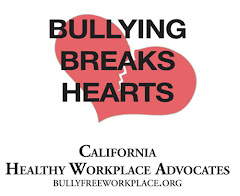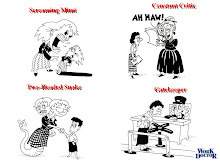Jane Applegate President & CEO, The Applegate Group Inc.,
September 20,2011
Everyone has experienced a bad day at the office when people are yelling and screaming at each other in frustration. But, if one person is the target of constant verbal and emotional abuse, it can escalate into a troubling case of ‘workplace bullying.’
Many small business owners refuse to acknowledge workplace bullying, preferring to hope the antagonist will eventually stop picking on a targeted co-worker. But, if you do nothing, the situation usually worsens, creating serious health and emotional problems for the bullied worker—and financial stress for employers, according to experts in the field.
If business owners don’t deal with bullying at work, it could result in a violent act. According to the U.S. Department of Justice, about two million violent crimes occur at American workplaces every year.
“There’s a real bottom line reason for business owners to take this problem seriously,” said David Yamada, professor of law and director of the New Workplace Institute at Suffolk University Law School in Boston. “If you are working in close quarters and things are tense and combative, it’s likely to affect everyone’s morale.”
An expert on workplace issues, Yamada authored the ‘Healthy Workplace’ bill, which has been introduced by legislators in 21 states. Currently, 16 versions of the bill—which aims to protect bullied workers from abusers, extending legal protections currently not available to them—are under review in 11 states. Most people think federal employment and discrimination laws protect workers from bullying, but they don’t, according to Yamada.
Being bullied at work makes life miserable. Experts say bullied workers suffer from anxiety, hypertension, depression and other stress-related illnesses. A 2010 Zogby study revealed that about 35 percent of all adult Americans have been bullied and 15 percent of the population has witnessed workplace bullying. The survey was authored by Dr. Gary Namie, Ph.D., and his wife Ruth.
Considered experts on workplace bullying, they have written extensively on the topic and consult with companies dealing with bullying issues. Their newest book, The Bully-free Workplace: Stop Jerks, Weasels and Snakes from Killing Your Organization, provides readers with an in-depth look at the problem and several strategies for dealing with workplace bullying.
“Bullying runs rampant in small businesses,” said Namie. “The owner wants to avoid conflict and doesn’t know what to do. They prefer to tell the abuser and the target, ‘you guys work this out.’”
Namie said he became interested in workplace bullying issues after his wife, Ruth, who is a psychologist, was bullied at work. “Our research shows 66 percent of women who are bullied at work lose their jobs,” said Gary Namie. “Forty-one percent quit, and 25 percent are fired.”
People bullied at work feel trapped—similar to someone suffering from domestic violence. It’s often worse for a bullied worker who feels he or she has to take the abuse because they really need the job, especially during this lingering economic slump.
How do you know if you have a bully in your midst?
“Bullying is a hostile, repeated behavior meant to make people feel badly,” said Carolyn Fedigan, a Boston-area human resources consultant who helps clients deal with bullying problems.
“I’ve dealt with a CEO who would regularly say to his secretary, ‘What, are you stupid?’”
Fedigan said some bullies take a more subtle approach. “They leave people out of communication loops, they spread gossip or single people out for the silent treatment,” she said.
No matter how distasteful it is, business owners can’t turn their backs on the problem. “There is a real financial cost to companies that let this toxic behavior continue, “ said Fedigan. “Bullied people take sick leaves, go out on disability and lose productivity.”
She said many business owners tolerate a bully if the person is a great salesperson or clients love them. “Sometimes the boss is scared of the bully,” she said. “They worry about the cost of turnover, of recruiting and training a new person.”
Business owners have to put their foot down and say, ‘We don’t accept this kind of behavior.” She said it’s important to have a written policy prohibiting workplace bullying. It’s also important to encourage your employees to report any inappropriate or bad behavior. “You have to have the kind of environment where employees can tell the boss what’s happening to them.”
Companies often hire Fedigan to counsel bullies. She works one on one with them, delving into why they are acting inappropriately towards a colleague. “Often, they have no idea they are a bully,” she said. “They think it’s an okay way to behave.”
Consider drafting an anti-bullying policy for your business that defines the problem and then:
Provides a procedure to report incidents.
Includes a ‘no retaliation’ provision.
Encourages employees to report incidents.
Informs employees that violations may result in discipline.



























No comments:
Post a Comment